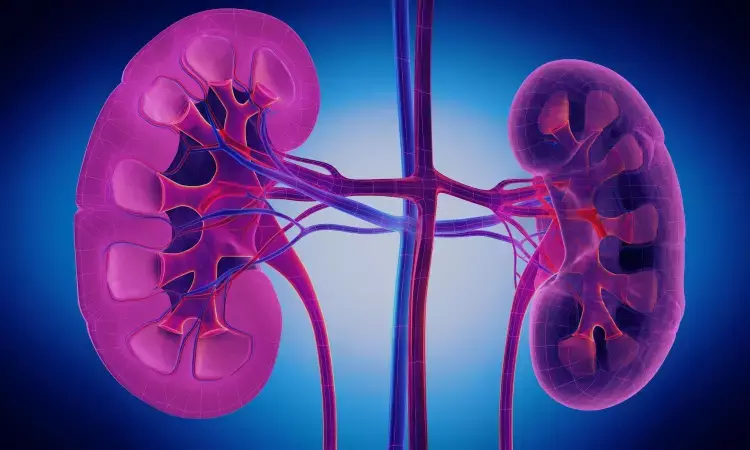- Home
- Medical news & Guidelines
- Anesthesiology
- Cardiology and CTVS
- Critical Care
- Dentistry
- Dermatology
- Diabetes and Endocrinology
- ENT
- Gastroenterology
- Medicine
- Nephrology
- Neurology
- Obstretics-Gynaecology
- Oncology
- Ophthalmology
- Orthopaedics
- Pediatrics-Neonatology
- Psychiatry
- Pulmonology
- Radiology
- Surgery
- Urology
- Laboratory Medicine
- Diet
- Nursing
- Paramedical
- Physiotherapy
- Health news
- Fact Check
- Bone Health Fact Check
- Brain Health Fact Check
- Cancer Related Fact Check
- Child Care Fact Check
- Dental and oral health fact check
- Diabetes and metabolic health fact check
- Diet and Nutrition Fact Check
- Eye and ENT Care Fact Check
- Fitness fact check
- Gut health fact check
- Heart health fact check
- Kidney health fact check
- Medical education fact check
- Men's health fact check
- Respiratory fact check
- Skin and hair care fact check
- Vaccine and Immunization fact check
- Women's health fact check
- AYUSH
- State News
- Andaman and Nicobar Islands
- Andhra Pradesh
- Arunachal Pradesh
- Assam
- Bihar
- Chandigarh
- Chattisgarh
- Dadra and Nagar Haveli
- Daman and Diu
- Delhi
- Goa
- Gujarat
- Haryana
- Himachal Pradesh
- Jammu & Kashmir
- Jharkhand
- Karnataka
- Kerala
- Ladakh
- Lakshadweep
- Madhya Pradesh
- Maharashtra
- Manipur
- Meghalaya
- Mizoram
- Nagaland
- Odisha
- Puducherry
- Punjab
- Rajasthan
- Sikkim
- Tamil Nadu
- Telangana
- Tripura
- Uttar Pradesh
- Uttrakhand
- West Bengal
- Medical Education
- Industry
Novel model may predict hypoglycemia risk during hemodialysis among diabetic nephropathy patients

China: A research team in China developed an automatic calculation model to predict the risk of hypoglycemia during hemodialysis for patients with diabetic nephropathy (DN).
The researchers in their study published in Diabetology & Metabolic Syndrome revealed that the risk prediction model had a good prediction outcome. In patients with diabetic nephropathy, they found a high incidence of hypoglycemia during hemodialysis.
"The hypoglycemia prediction automatic calculation that was developed using this model can be used to predict hypoglycemia risk in diabetic nephropathy patients during hemodialysis and also help identify those with a high risk of hypoglycemia during hemodialysis," the researchers wrote in their study.
Diabetic nephropathy, the damage of renal function secondary to diabetes, is one of the most important and serious complications of diabetes. When DN patients progress to the end stage, they should be treated with renal replacement therapy, which usually includes hemodialysis. Hemodialysis is of great importance to prolong the patient's lifespan and improve their survival satisfaction.
During hemodialysis, hypoglycemia is one of the most common complications in DN patients, with an incidence rate of 53.5% -80 %. Yu Liu, School of Nursing, Beijing University of Chinese Medicine, Beijing, China, and colleagues aimed to construct a clinical automatic calculation to predict the risk of hypoglycemia during hemodialysis for patients with diabetic nephropathy.
In the cross-sectional study, patients provided information for the questionnaire and received blood glucose tests during hemodialysis. Data analysis was done with logistic regression and then, based on the results, an automated calculator for risk prediction was constructed. It recruited 207 hemodialysis patients with diabetes nephropathy from May to November 2022.
The blood glucose meter was used uniformly for blood glucose tests 15 minutes before the end of hemodialysis or when the patient did not feel well during hemodialysis.
The study led to the following findings:
- The incidence of hypoglycemia during hemodialysis of patients with DN was 50.2%.
- The hemodialysis duration of 8 ~ 21 years, hypotension during the last hemodialysis, hyperglycemia on the latest hemodialysis night, disturbance of potassium metabolism, and serum albumin < 35 g/L were the predictors for hypoglycemia during hemodialysis of the patients.
- The automatic calculation for hemodialysis patients with DN was constructed based on the logistic regression equation and has good predictive performance.
- In the automatic calculation, the total scores of 14~18, 10~13, 6~9, and 0~5, respectively corresponded to the very high, high, moderate, and low risk of hypoglycemia during hemodialysis.
The calculation would be helpful for medical staff to guide patients in medication and decrease the incidence of medical accidents. For patients, it will assist them to better understand their health state and take measures within their power to reduce the occurrence of hemodialysis hypoglycemia.
"It would be of great importance for future research to explore other factors that may contribute to hypoglycemia prediction, analyze the long-term impact of our research findings, or investigate the effectiveness of different interventions to prevent hypoglycemia," the researchers concluded.
Reference:
Zhang, RT., Liu, Y., Lin, KK. et al. Development of a clinical automatic calculation of hypoglycemia during hemodialysis risk in patients with diabetic nephropathy. Diabetol Metab Syndr 15, 199 (2023). https://doi.org/10.1186/s13098-023-01177-9
Dr Kamal Kant Kohli-MBBS, DTCD- a chest specialist with more than 30 years of practice and a flair for writing clinical articles, Dr Kamal Kant Kohli joined Medical Dialogues as a Chief Editor of Medical News. Besides writing articles, as an editor, he proofreads and verifies all the medical content published on Medical Dialogues including those coming from journals, studies,medical conferences,guidelines etc. Email: drkohli@medicaldialogues.in. Contact no. 011-43720751


